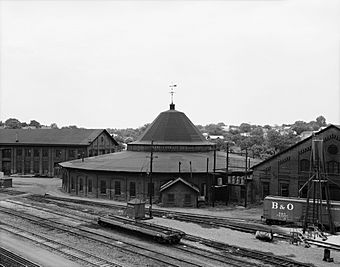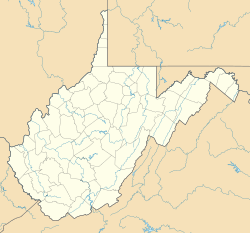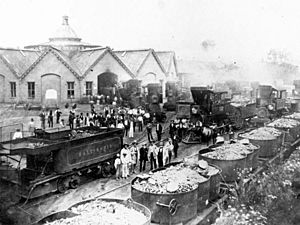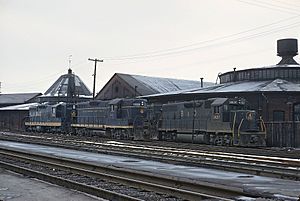Baltimore and Ohio Railroad Martinsburg Shops facts for kids
|
Baltimore and Ohio Railroad Martinsburg Shops
|
|

B&O Martinsburg West Roundhouse
|
|
| Location | 300 East Martin Street, Martinsburg, West Virginia |
|---|---|
| Area | 3 acres (1.2 ha) |
| Built | 1866 |
| Architect | Albert Fink; Johann Niernsee |
| NRHP reference No. | 03001045 |
Quick facts for kids Significant dates |
|
| Added to NRHP | July 31, 2003 |
| Designated NHL | July 31, 2003 |
The Baltimore and Ohio Railroad Martinsburg Shops are a really old and important set of buildings in Martinsburg, West Virginia. These shops are famous for their cool railroad designs by Albert Fink and John Rudolph Niernsee. They also played a big part in the Great Railroad Strike of 1877.
This historic place has three main buildings. One of them is the oldest covered roundhouse in the whole United States! The Baltimore and Ohio Railroad Company first came to Martinsburg in the late 1840s. That's when they built their first engine and machine shops. These were needed for the company as it grew bigger.
In 2003, the shops became a National Historic Landmark. This means they are very important to the history of the United States. Today, a local group takes care of them. You can even rent them for special events!
Contents
Early Railroad History in Martinsburg
The Baltimore and Ohio Railroad (B&O) company started on February 28, 1827. It was one of America's first railroads. On May 21, 1842, the first steam locomotive (a train engine) arrived in Martinsburg. Later that year, on November 10, the first passenger train also came through. The very first roundhouse complex was built between 1848 and 1850. A roundhouse is a special building where train engines are stored and repaired.
Martinsburg Shops During the Civil War
The American Civil War caused a lot of trouble in the Martinsburg area. This was especially true for the railroad yards. On May 22, 1861, troops led by Stonewall Jackson stopped all trains going east. This happened at Martinsburg and Point of Rocks.
After catching all the trains he could, Jackson's troops damaged the railroad. They blew up bridges to the west and blocked the tracks to the east. Many B&O trains and equipment were taken or destroyed. In total, 42 train engines and 386 cars were lost. Miles of track, many bridges, and telegraph wires were also destroyed. The B&O roundhouse and machine shops were ruined too.
On October 19, 1862, the roundhouse complex was burned again. This time, it was set on fire by Confederate troops.
Rebuilding and the Great Railroad Strike
After the Civil War, the B&O company began to rebuild the site in 1866. From 1866 to 1872, the current roundhouse complex was put back together. Other important buildings were also built during this time. These included the West Roundhouse, East Roundhouse, Bridge & Machine Shop, and the Frog & Switch Shop.
On July 16, 1877, a big event happened. The first nationwide strike in the U.S. began right here. It was called the Great Railroad Strike of 1877. Rail workers in Martinsburg started protesting because their pay was cut. After efforts to stop the protests didn't work, the governor asked for help from federal troops. By the time order was restored, the workers' protest had spread across the entire country.
The Shops in Modern Times
The Martinsburg shops were used for railroad work until March 14, 1988. After that, all local operations moved to other places. On May 14, 1990, some people set fire to wooden pallets in the East Roundhouse. This fire almost completely destroyed the building. Only parts of its outer walls are still standing today.
In February 1999, the Berkeley County Commission bought the historic railroad property. They paid $150,000 for it. In April 2000, the property was given to the Berkeley County Roundhouse Authority. This group is a public, nonprofit organization. It was created by the West Virginia Legislature in 1999.
Work to save and improve this historic railroad site is still happening. The buildings are open for public tours. You can also rent them for special events. On July 31, 2003, the B&O Roundhouse was officially named a National Historic Landmark. It was also added to the National Register of Historic Places.





